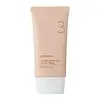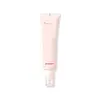What's inside
What's inside
 Key Ingredients
Key Ingredients

 Benefits
Benefits

 Concerns
Concerns

 Ingredients Side-by-side
Ingredients Side-by-side

Water
Skin ConditioningZinc Oxide
Cosmetic ColorantCyclohexasiloxane
EmollientPropanediol
SolventPropylheptyl Caprylate
EmollientCaprylyl Methicone
Skin ConditioningTrimethylsiloxysilicate
EmollientPolyglyceryl-3 Polydimethylsiloxyethyl Dimethicone
Skin ConditioningTitanium Dioxide
Cosmetic ColorantNiacinamide
SmoothingDisiloxane
Skin ConditioningButyloctyl Salicylate
Skin ConditioningCentella Asiatica Extract
CleansingPolygonum Cuspidatum Root Extract
AntioxidantScutellaria Baicalensis Root Extract
AstringentCamellia Sinensis Leaf Extract
AntimicrobialRosmarinus Officinalis Leaf Extract
AntimicrobialChamomilla Recutita Flower Extract
MaskingArtemisia Capillaris Extract
Glycyrrhiza Glabra Root Extract
BleachingHouttuynia Cordata Extract
Skin ConditioningMelaleuca Alternifolia Leaf Extract
PerfumingRosmarinus Officinalis Leaf Oil
MaskingDisteardimonium Hectorite
StabilisingMagnesium Sulfate
Triethoxycaprylylsilane
1,2-Hexanediol
Skin ConditioningPolyglyceryl-2 Dipolyhydroxystearate
Skin ConditioningLauryl Polyglyceryl-3 Polydimethylsiloxyethyl Dimethicone
Skin ConditioningMethyl Methacrylate Crosspolymer
Polymethylsilsesquioxane
Dicaprylyl Carbonate
EmollientGlyceryl Caprylate
EmollientCaprylyl Glycol
EmollientMica
Cosmetic ColorantAluminum Hydroxide
EmollientEthylhexylglycerin
Skin ConditioningPerfluorooctyl Triethoxysilane
Tocopherol
AntioxidantButylene Glycol
HumectantPentylene Glycol
Skin ConditioningCI 77492
Cosmetic ColorantCI 77491
Cosmetic ColorantCI 77499
Cosmetic ColorantWater, Zinc Oxide, Cyclohexasiloxane, Propanediol, Propylheptyl Caprylate, Caprylyl Methicone, Trimethylsiloxysilicate, Polyglyceryl-3 Polydimethylsiloxyethyl Dimethicone, Titanium Dioxide, Niacinamide, Disiloxane, Butyloctyl Salicylate, Centella Asiatica Extract, Polygonum Cuspidatum Root Extract, Scutellaria Baicalensis Root Extract, Camellia Sinensis Leaf Extract, Rosmarinus Officinalis Leaf Extract, Chamomilla Recutita Flower Extract, Artemisia Capillaris Extract, Glycyrrhiza Glabra Root Extract, Houttuynia Cordata Extract, Melaleuca Alternifolia Leaf Extract, Rosmarinus Officinalis Leaf Oil, Disteardimonium Hectorite, Magnesium Sulfate, Triethoxycaprylylsilane, 1,2-Hexanediol, Polyglyceryl-2 Dipolyhydroxystearate, Lauryl Polyglyceryl-3 Polydimethylsiloxyethyl Dimethicone, Methyl Methacrylate Crosspolymer, Polymethylsilsesquioxane, Dicaprylyl Carbonate, Glyceryl Caprylate, Caprylyl Glycol, Mica, Aluminum Hydroxide, Ethylhexylglycerin, Perfluorooctyl Triethoxysilane, Tocopherol, Butylene Glycol, Pentylene Glycol, CI 77492, CI 77491, CI 77499
Water
Skin ConditioningCaprylic/Capric Triglyceride
MaskingCI 77891
Cosmetic ColorantGlycerin
HumectantMethyl Trimethicone
Skin ConditioningButylene Glycol Dicaprylate/Dicaprate
EmollientCaprylyl Methicone
Skin ConditioningDicaprylyl Carbonate
EmollientDiethylamino Hydroxybenzoyl Hexyl Benzoate
UV FilterEthylhexyl Triazone
UV AbsorberNiacinamide
SmoothingPentylene Glycol
Skin ConditioningPolyglyceryl-3 Distearate
Emulsifying1,2-Hexanediol
Skin ConditioningPotassium Cetyl Phosphate
EmulsifyingC20-22 Alkyl Phosphate
EmulsifyingAluminum Hydroxide
EmollientAmmonium Acryloyldimethyltaurate/Vp Copolymer
Cetearyl Olivate
Sorbitan Sesquioleate
EmulsifyingTrimethylsiloxysilicate
EmollientStearic Acid
CleansingIsododecane
EmollientSorbitan Olivate
EmulsifyingSilica
AbrasiveTromethamine
BufferingGlyceryl Stearate Citrate
EmollientEthylhexylglycerin
Skin ConditioningTriethoxycaprylylsilane
Adenosine
Skin ConditioningTrisodium Ethylenediamine Disuccinate
Tocopherol
AntioxidantHydrogenated Lecithin
EmulsifyingCeramide NP
Skin ConditioningSodium Stearoyl Glutamate
CleansingC20-22 Alcohols
Emulsion StabilisingCetearyl Alcohol
EmollientCarbomer
Emulsion StabilisingParfum
MaskingCI 77491
Cosmetic ColorantWater, Caprylic/Capric Triglyceride, CI 77891, Glycerin, Methyl Trimethicone, Butylene Glycol Dicaprylate/Dicaprate, Caprylyl Methicone, Dicaprylyl Carbonate, Diethylamino Hydroxybenzoyl Hexyl Benzoate, Ethylhexyl Triazone, Niacinamide, Pentylene Glycol, Polyglyceryl-3 Distearate, 1,2-Hexanediol, Potassium Cetyl Phosphate, C20-22 Alkyl Phosphate, Aluminum Hydroxide, Ammonium Acryloyldimethyltaurate/Vp Copolymer, Cetearyl Olivate, Sorbitan Sesquioleate, Trimethylsiloxysilicate, Stearic Acid, Isododecane, Sorbitan Olivate, Silica, Tromethamine, Glyceryl Stearate Citrate, Ethylhexylglycerin, Triethoxycaprylylsilane, Adenosine, Trisodium Ethylenediamine Disuccinate, Tocopherol, Hydrogenated Lecithin, Ceramide NP, Sodium Stearoyl Glutamate, C20-22 Alcohols, Cetearyl Alcohol, Carbomer, Parfum, CI 77491
 Reviews
Reviews

Ingredients Explained
These ingredients are found in both products.
Ingredients higher up in an ingredient list are typically present in a larger amount.
1,2-Hexanediol is a synthetic liquid and another multi-functional powerhouse.
It is a:
- Humectant, drawing moisture into the skin
- Emollient, helping to soften skin
- Solvent, dispersing and stabilizing formulas
- Preservative booster, enhancing the antimicrobial activity of other preservatives
Aluminum Hydroxide is a form of aluminum. It can be naturally found in nature as the mineral gibbsite. In cosmetics, Aluminum Hydroxide is used as a colorant, pH adjuster, and absorbent.
As a colorant, Aluminum Hydroxide may add opacity, or reduce the transparency. Aluminum hydroxide is contains both basic and acidic properties.
According to manufacturers, this ingredient is an emollient and humectant. This means it helps hydrate the skin.
In medicine, this ingredient is used to help relieve heartburn and help heal ulcers.
There is currently no credible scientific evidence linking aluminum hydroxide in cosmetics to increased cancer risk.
Major health organizations allow the use of aluminum hydroxide in personal care products and have not flagged it as a carcinogenic risk at typical usage levels.
Learn more about Aluminum HydroxideCaprylyl Methicone is a type of silicone.
It helps soften and soothe the skin by creating a thin film on top. This film helps trap moisture, keeping your skin hydrated.
Ci 77491 is also hydrated iron III oxide. It's sole purpose is to give a red/pink hue to products.
Iron III oxides are classified as inorganic chemicals for coloring.
Synthetically created Ci 77491 is considered safer than those naturally found. This is because the synthetically created version may contain less impurities. Iron oxides are generally non-toxic and non-allergenic.
Learn more about CI 77491Dicaprylyl Carbonate comes from carbonic acid and caprylyl alcohol, a fatty alcohol. It is an emollient and gives skin a velvet feel. The sources of Dicaprylyl Carbonate may be synthetic or from animals.
As an emollient, Dicaprylyl Carbonate creates a film on the skin. This film traps moisture in, keeping your skin soft and hydrated.
Ethylhexylglycerin (we can't pronounce this either) is commonly used as a preservative and skin softener. It is derived from glyceryl.
You might see Ethylhexylglycerin often paired with other preservatives such as phenoxyethanol. Ethylhexylglycerin has been found to increase the effectiveness of these other preservatives.
Niacinamide is a multitasking form of vitamin B3 that strengthens the skin barrier, reduces pores and dark spots, regulates oil, and improves signs of aging.
And the best part? It's gentle and well-tolerated by most skin types, including sensitive and reactive skin.
You might have heard of "niacin flush", or the reddening of skin that causes itchiness. Niacinamide has not been found to cause this.
In very rare cases, some individuals may not be able to tolerate niacinamide at all or experience an allergic reaction to it.
If you are experiencing flaking, irritation, and dryness with this ingredient, be sure to double check all your products as this ingredient can be found in all categories of skincare.
When incorporating niacinamide into your routine, look out for concentration amounts. Typically, 5% niacinamide provides benefits such as fading dark spots. However, if you have sensitive skin, it is better to begin with a smaller concentration.
When you apply niacinamide to your skin, your body converts it into nicotinamide adenine dinucleotide (NAD). NAD is an essential coenzyme that is already found in your cells as "fuel" and powers countless biological processes.
In your skin, NAD helps repair cell damage, produce new healthy cells, support collagen production, strengthen the skin barrier, and fight environmental stressors (like UV and pollution).
Our natural NAD levels start to decline with age, leading to slower skin repair, visible aging, and a weaker skin barrier. By providing your skin niacinamide, you're recharging your skin's NAD levels. This leads to stronger, healthier, and younger looking skin.
Another name for vitamin B3 is nicotinamide. This vitamin is water-soluble and our bodies don't store it. We obtain Vitamin B3 from either food or skincare. Meat, fish, wheat, yeast, and leafy greens contain vitamin B3.
The type of niacinamide used in skincare is synthetically created.
Learn more about NiacinamidePentylene glycol is typically used within a product to thicken it. It also adds a smooth, soft, and moisturizing feel to the product. It is naturally found in plants such as sugar beets.
The hydrophilic trait of Pentylene Glycol makes it a humectant. As a humectant, Pentylene Glycol helps draw moisture from the air to your skin. This can help keep your skin hydrated.
This property also makes Pentylene Glycol a great texture enhancer. It can also help thicken or stabilize a product.
Pentylene Glycol also acts as a mild preservative and helps to keep a product microbe-free.
Some people may experience mild eye and skin irritation from Pentylene Glycol. We always recommend speaking with a professional about using this ingredient in your routine.
Pentylene Glycol has a low molecular weight and is part of the 1,2-glycol family.
Learn more about Pentylene GlycolTocopherol (also known as Vitamin E) is a common antioxidant used to help protect the skin from free-radicals and strengthen the skin barrier. It's also fat soluble - this means our skin is great at absorbing it.
Vitamin E also helps keep your natural skin lipids healthy. Your lipid skin barrier naturally consists of lipids, ceramides, and fatty acids. Vitamin E offers extra protection for your skin’s lipid barrier, keeping your skin healthy and nourished.
Another benefit is a bit of UV protection. Vitamin E helps reduce the damage caused by UVB rays. (It should not replace your sunscreen). Combining it with Vitamin C can decrease sunburned cells and hyperpigmentation after UV exposure.
You might have noticed Vitamin E + C often paired together. This is because it is great at stabilizing Vitamin C. Using the two together helps increase the effectiveness of both ingredients.
There are often claims that Vitamin E can reduce/prevent scarring, but these claims haven't been confirmed by scientific research.
Learn more about TocopherolTriethoxycaprylylsilane is a silicone used to bind and stabilize ingredients.
As an emulsifier, it helps prevent ingredients from separating. This can help elongate the shelf life of products.
Triethoxycaprylylsilane is often used to coat mineral sunscreens ingredients to help give a better feel. It also helps reduce oxidative stress in sunscreens.
Learn more about TriethoxycaprylylsilaneThis silicone is an emollient. Emollients create a thin film on the skin to prevent moisture from escaping.
It is not soluble in water and helps increase water-resistance in products.
According to a manufacturer, it can blend seamlessly with silicone oils, such as Cyclopentasiloxane.
Learn more about TrimethylsiloxysilicateWater. It's the most common cosmetic ingredient of all. You'll usually see it at the top of ingredient lists, meaning that it makes up the largest part of the product.
So why is it so popular? Water most often acts as a solvent - this means that it helps dissolve other ingredients into the formulation.
You'll also recognize water as that liquid we all need to stay alive. If you see this, drink a glass of water. Stay hydrated!
Learn more about Water